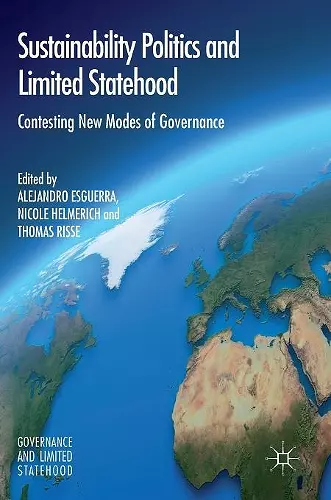Sustainability Politics and Limited Statehood
Contesting the New Modes of Governance
Thomas Risse editor Alejandro Esguerra editor Nicole Helmerich editor
Format:Hardback
Publisher:Springer International Publishing AG
Published:5th Dec '16
Currently unavailable, and unfortunately no date known when it will be back

"The analysis of new modes of governance has become one of the most fruitful areas in International Relations research. Yet so far, most studies have focused on industrialized countries and stable democracies. Sustainability Politics and Limited Statehood now makes a crucial new contribution to this debate by expanding the analysis to areas and sectors where traditional state authority is weak or non-existent. The authors convincingly show in numerous rich case studies how and under what conditions new modes of governance can successfully operate also in areas of limited statehood. This timely volume is hence a vital contribution to one of the most fascinating debates in both international relations and sustainability governance research, and will be highly useful to theorists and practitioners alike." (Frank Bierman, Utrecht University, Netherlands) "What are the prospects for sustainable governance in areas of limited statehood? How do polycentric modes of governance, popularized after the Paris Climate Change Agreement, with their reliance of various soft-forms of powers, operate in areas of limited statehood? These timely and important questions are seriously addressed by this collection of talented and imaginative junior scholars. They find that general governance functions and mechanisms still operate in these regions in local and specific ways, although there are opportunities for their improvement. It is not just the state which is essential for promoting sustainability but also constellations of non-state actors who can and do contribute meaningfully to sustainability efforts in the world's poorest countries." (Peter M. Haas, University of Massachusetts Amherst, USA)
The contributors to this book critically examine the performance of new modes of governance in areas of limited statehood, drawing on a range of in-depth case studies on issues of climate change, biodiversity, and health.
The contributors to this book critically examine the performance of new modes of governance in areas of limited statehood, drawing on a range of in-depth case studies on issues of climate change, biodiversity, and health. The Paris Agreement for Climate Change or the Sustainable Development Goals (SDGs) rely on new modes of governance for implementation. New modes of governance such as market-based instruments, public-private partnerships or stakeholder participation initiatives have been praised for playing a pivotal role in effective and legitimate sustainability governance. Yet, do they also deliver in areas of limited statehood? States such as Malaysia or the Dominican Republic partly lack the ability to implement and enforce rules; their domestic sovereignty is limited. Exploring this perspective on governance, the authors demonstrate that areas of limited statehood are not ungoverned or ungovernable spaces. The book elaborates how and under what conditions new modes of governance emerge in areas of limited statehood, and examines their relative effectiveness.
ISBN: 9783319398709
Dimensions: unknown
Weight: 462g
238 pages
1st ed. 2017